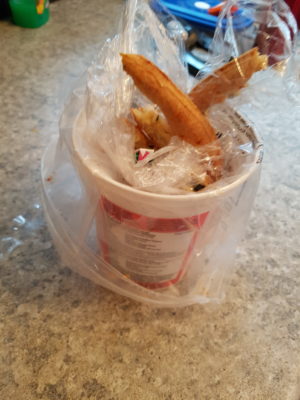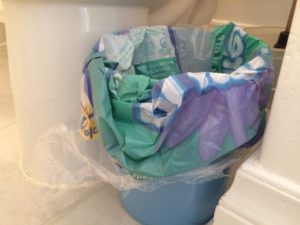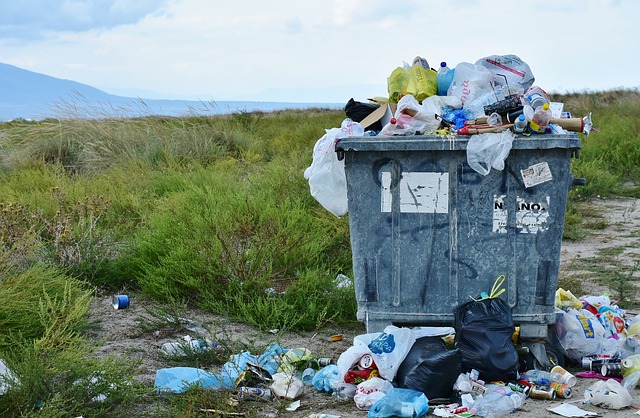It’s back in the news again – should Winnipeg ban the plastic bag?
You’ve probably read about Minister Squires’ January 1st tweet, where she responded to Montreal’s decision to become the latest Canadian city to ban single-use plastic bags. Our minister of sustainable development took to twitter to ask if Winnipeg should be next.
The question kicked off a media flurry (check out the stories on CBC and the Winnipeg Free Press) and, as one can expect in 2018, many responses on social media and The Comments Section (read at your own risk).
My summary: many citizens in support, the usual “don’t they have anything better to do” critics have chimed in (note: we elect representatives to government to govern) and a strong contingent of folks who are wary of banning the plastic shopping bag as it could potentially result in more purchases of garbage bags. Multi-Material Stewardship Manitoba (MMSM) does not support this ban, articulated by Bob Cox in his Free Press opinion piece.
What is Winnipeg to do? Can the city ban plastic bags and not have its citizens purchasing more garbage bags to replace them to line their bins?
I say, BAN THE BAG! We need to think about using less, instead of recycling more. I know when I’m out shopping, more often than not, I have to say “please, no bag” rather than paying a fee for a bag. I’m going to assume most folks accept the bag without much thought. It’s been over 7 years since Sorting Through Plastic, our post on advocating for more use of reusable bags, came out. It’s time to take the next step forward.
Here’s the deal: we have an unhealthy, unsustainable dependence upon plastic and we have got to start to use less by becoming more conscious of our choices.
Mr. Cox does take the time to illustrate all of the unhealthy, unsustainable choices we make in our grocery shopping, from driving there and back (often in an SUV), buying food wrapped in plastic and, on top of that, I’ll add that we’re probably buying way too much (Canadians have a miserable record of food waste – 6 million tonnes each year). I agree, we make bad decisions every day that negatively affect our health and the health of our planet. Must we wait to ban single-use plastic until all other problems are solved? No. The reality is we do not need plastic shopping bags and by banning them, we can all do a rethink of how we manage our waste.
When this story broke in the news this month, our office at Green Action Centre was buzzing with the various ways we all manage our plastic use, and I thought I’d gather a few of those ideas together here.

A yogurt container and bread bag can collect the wet garbage that can’t go in the compost.
Because I compost, I have almost no garbage. Waste goes to one of thee places:
- Compost goes into the freezer and is tossed in my backyard compost bin a few times a week.
- Dry garbage goes in my main bin, no plastic liner needed. This is for things like the lining of cereal boxes, packaging (beware ordering products from Amazon and elsewhere, it’s going to arrived wrapped in some kind of bubble-wrap) and any other waste that won’t drip.
- Wet garbage (the gunk in your sink trap, non-compostable food waste etc) goes into a yogurt container that I’ve lined with a bread bag, or other plastic (you can use produce bags, the bags that your Free Press newspaper arrives in each morning (why?) or other plastic.) This really makes you think about how much plastic we end up with on an almost daily basis.

Packaging from bulk items makes a great liner for a large bin.
Compost Queen, Sylvie, had a fantastic idea for larger garbage bins. “Since I use reusable bags when I shop, I don’t have shopping bags at home to use as garbage bags. What I use to line my garbage can is plastic packaging such as a 12-pack toilet paper rolls. Also, I’m going to get myself a mini garbage bin for my kitchen so that I can use bread bags too.”
Jaret sent me some tips for his compost bin. “I can keep a relatively clean compost pail (no lid) by dropping in paper bags and then tossing the whole bag. I save my bags from the pharmacy, MLCC, etc. But a folded up newspaper does the trick just the same (if you haven’t been at the MLCC lately).”

Use paper bags to line your compost bucket for easy clean-up. Get those pets to help!
Executive Director Tracy shared Rachel Sarnoff’s spectacular TedTalk Can One Straw Change the World?, which is a must watch. She also has a strategy for tackling those produce bags: “I take my produce up to the till loose and have it weighed like that, then put into my own bags; yes, it might drive some cashiers a little crazy but if everyone did it you can bet they’d have a solution for those produce bags too.”
Beth contributed an anecdote that summarizes the power that bans and fees have on human behaviour. She was behind a man at the grocery store. The clerked asked “do you need any plastic bags?” and he replied by asking if there was a charge. The clerk replied that, no, they didn’t change for grocery bags, and the fellow’s response was “then double-bag, please.”
We can educate folks about the harm of plastic all we want, but the reality is that if we are serious about making a positive impact, we need to just eliminate the option of single-use plastics wherever and whenever possible. For every Die-Hard Cloth Bag User, there is an Unnecessary Double-Bagger out there. Stop giving them the option!
Mr. Cox highlights statistics from MMSM, pointing out that in Manitoba “just” 47 plastic bags per Manitoban were classified as single use in 2015. 47 bags per person in a city of over 700,000 is a substantial amount. MMSM also points out that their efforts have been effective in reducing the growth in plastic bag use; however, they also note that use has leveled off. Clearly, Manitobans have made substantial behaviour change to reach this plateau, but it’s obvious that to get to the next level, reduction, we need to take that behaviour change up a notch by eliminating the choice to use the single use bag in the first place. As board member Peter Denton stated in his op-ed, Recycling Plastic Isn’t Enough, “Anyone who argues for the continued use of disposable plastic is on the wrong side of science and history.”
Do what you can today to become aware of how much plastic you and your family consume, and how you can make creative, healthy and sustainable changes. When the weather warms up, why not take part in Plastic Free July, and encourage your friends and family to join you? Please share your ideas and thoughts on plastic in the comments section below (The Green Action Blog Comments are recommended reads!)
Plastic hasn’t always been a part of our lives. Let’s work together to have a plastic free future!




Don’t throw your cereal and cracker liners, or chip and taco bags or licorice envelopes in your dry garbage! They make great wet garbage collectors. This reduces dry garbage even more and reduces need for produce bags in first place (since you can go without or bring a reusable one). I buy meat in bulk and then freeze in smaller batches in my cracker liners and chip bags. The cracker liners are waterproof – so great for defrosting too!
I support the “pay to pollute” environmental economics principle. Determine an environmental cost for plastic bags E.g. $1 or $2 per bag. Most will decide that cost is too high and choose on their own not to use plastic. The few that do – will be financially assisting in recycling programs. McD quit using the stryrofoam clamshell because of public pressure and prospect of lost revenue, not regulations. Once plastic is less available, provincial or national regulations would be easier to implement.
YES, YES, YES, to banning plastic bags in Manitoba. I use the same garbage method as you. Compost goes in a plastic pail with a lid, dry garbage into an unlined garbage can and then I have a small crock which I line with bread bags, etc (the bags you simply can’t avoid) for the wet garbage. Once you start separating it like that, it’s amazing how little wet garbage you actually have. We don’t own garbage bags of any size. Our garbage goes straight into the outside bin with no bags. I would be all over a petition on this if someone was willing to create one.
Whether it is shopping bags, bread bags or Free Press bags, the plastic ends up in the land fill.
What has not been tried yet is requiring retailers to charge something substantial for a plastic bag as an incentive for customers to bring their own bags. A number of years ago, I wrote a resolution, which was adopted by the Provincial Council of Women of Manitoba, which called for retailers to offer one-use plastic bags for $.25 and reusable bags for $1. With inflation that could be raised. Paying several dollars to have your groceries bagged should make you think twice.
After recycling and composting, and taking plastic bags, such as bread bags,back to the store, We have very little garbage to put in a plastic grocery bag, which has already been used more than once. We usually only have to roll out the garbage cart about once every three or four months in the winter once a month in summer.
Great to hear from you, Carolyn! We’ve heard from others that there should be a stiff fee for plastic bags. I’d still like to see them banned – starting with grocery bags, and moving forward with plastic bottles and other disposable items. Awesome to hear you have a successful waste-management system at home. Isn’t amazing how little garbage you create?!? Well done!
My family makes much of its reduced plastic use. We hold on to single-use bags mostly to pick up after our dog. What can we use in their place for that purpose?
Great to hear from you, Mike! I have a dog too, and I use the compostable dog poo bags available at Superstore. If you own your home, you can also start a pet waste digester. Instructions here: https://greenactioncentre.ca/reduce-your-waste/what-to-do-with-doggie-doo-doo/
Glad you’re working hard to reduce your plastic use! Compostable bags are a reasonable alternative but they still won’t break down well in the landfill (that’s a systemic issue, where we need composting to be made available for pet waste). You can also consider using pooper scooper type devices, that are reusable plastic, and putting the dog waste directly into your garbage can (or wrapping it in used paper/newspaper first). Very shortly, we’re going to be putting out a blog on “responsible pet ownership” that tackles this and other related issues – keep your eyes open for it!